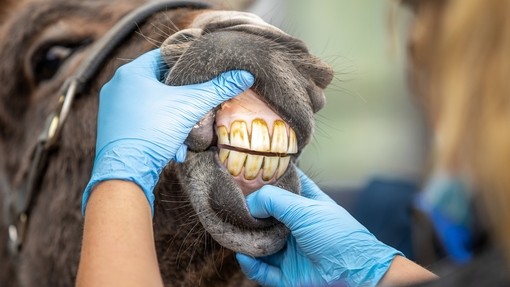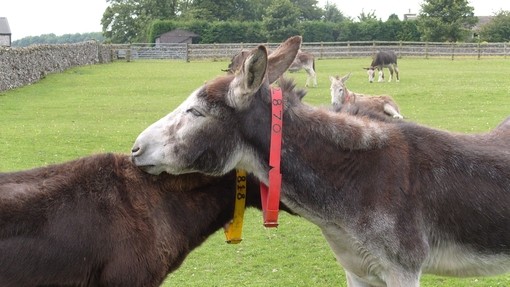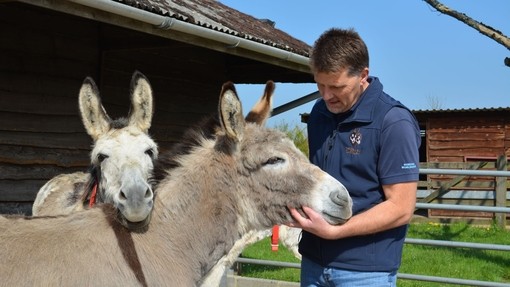Preparing your donkey for treatment
When preparing your donkey for a visit to the dentist, vet or farrier, what matters most is to ensure they have a positive experience. Properly preparing your donkey for veterinary interactions means they will feel safe and secure during their treatment. Being calm for the dentist ensures your donkey’s wellbeing is not compromised because the dentist cannot do their work.
Applying the science of behaviour
To prepare your donkey effectively for the dentist, it is important to use the science of behaviour, stretching your donkey’s comfort zones and communicating through positive and negative reinforcement. You can read more about this in our Understanding donkey behaviour resource.
What training does your donkey need?
The training your donkey needs depends on their current behaviour and acceptance of handling. If you have a donkey who is calm with everything, including the vet, then all they might need is some training for mouth handling and different smells and routine. If you have a donkey who is nervous of strangers, fearful of the vet, and reluctant to be caught, then it is important to work on these elements first.
For nervous donkeys, building their confidence is key, and so is having patience when working with your donkey to help solve their problems. You might need to help them become familiar with different routines and people before you can prepare them for a visit to the dentist.
You will always need to bring an element of generalisation to your training. Your donkey may become used to your calm, familiar routines, predicting how and where you do things. However, when it comes to their visit to the dentist, everything changes and they are immediately removed from their routine.
Changes like this can have a real impact on your donkey, challenging their ability to predict what is going to happen. Depending on their previous experiences, they might also predict that what is going to happen is likely to be unpleasant.
This is where generalisation comes in, gradually preparing a donkey for all the different variables in their life and slowly stretching what they are comfortable with. You might groom them in a new place, with one person or two people, at different times of day, or pick up their feet in a different order. All of these variations will help to properly prepare your donkey for changes to their routine.
When it comes to dental treatment specifically, you will need to have a plan to make sure your donkey is accepting of having their head held and their mouth touched and parted, and that they are comfortable with things like a head torch, rubber gloves and noisy tools. To ensure we don’t miss anything, we use a written shaping plan to prepare our donkeys for veterinary procedures.
How to set your donkey up to succeed
A successful dental visit starts with the right setting. It is vital to have a calm and familiar environment for a visit. Ensure everything is safe and give yourself and your donkey safe time to feel calm and relaxed.
It is crucial to find a qualified, highly recommended dental professional. Talk to them before the visit about what to expect and what you want and if needed, offer to pay them extra for more of their time so the treatment can be taken slowly.
Let the dentist know that you want your donkey to have a good experience, and should the donkey’s behaviour start to escalate as their anxiety grows, you will ask the dentist to stop work and discuss how to proceed. It is easier to set this boundary before the dentist visits rather than when things start to go wrong.
Please remember it is never your dentist, vet or farrier’s job to train your donkey. If you have concerns about your donkey’s ability to remain calm and comfortable during dental treatment and would like help assessing their behaviour and making a plan, please talk to your Donkey Welfare Adviser as soon as possible, or contact our behaviour team.




